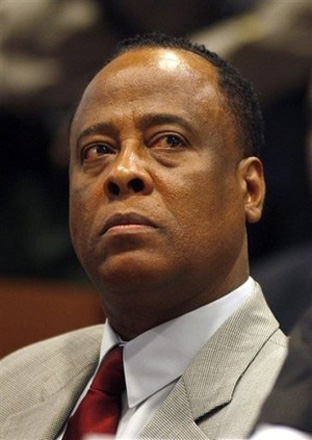A bodyguard of Michael Jackson who rushed to his bedroom as the singer was in his death throes testified Thursday that Dr Conrad Murray ordered him to hide vials of medicine before calling for an ambulance, dpa reported.
Alberto Alvarez testified on the third day of the closely watched trial in which Murray, 58, is accused of involuntary manslaughter in the June 2009 death of the troubled King of Pop. Jackson's personal physician has pleaded not guilty and faces four years in jail if convicted by the 12-member jury.
Alvarez, a witness for the prosecution, told the court that he rushed into Jackson's bedroom after being alerted by the singer's personal assistant and saw him lying on a bed while Murray administered chest compressions with one hand. He said the doctor asked him to put various medical supplies in a bag before calling 911.
The guard's testimony could prove crucial as prosecutors maintain that the delay in calling for emergency help partially constitutes the gross negligence needed for conviction. Prosecutors say that Murray was further negligent in giving Jackson the hospital anaesthetic propofol as a sleeping aid, and in failing to properly supervise his patient.
Murray's lawyer argued in his opening statement that Jackson might have self-administered the cocktail of drugs that caused his death, and that by the time Murray found him it was too late to save the singer.
"When I came into the room, he said, 'Alberto, hurry, we have to get him to a hospital, we have to get an ambulance,'" Alvarez said.
But before making the 911 call, he said, Murray instructed him to gather up medical supplies. "Here, put these in the bag," he quoted Murray as telling him, describing vials of medicine that match the description of propofol.
Prosecutors played the tape of Alvarez' emergency telephone call.
"I need an ambulance as soon as possible," Alvarez told an emergency operator, saying that a 50-year-old man had stopped breathing. "He's not responding to anything, sir."
Jackson aide: Doctor wanted to hide evidence
A bodyguard of Michael Jackson who rushed to his bedroom as the singer was in his death throes testified Thursday that Dr Conrad Murray ordered him to hide vials of medicine before calling for an ambulance, dpa reported.






